With travelers relying heavily on search engines to find the perfect stay, ensuring your hotel appears prominently in search results can significantly impact your bookings. One powerful tool that can enhance your hotel’s online presence is structured data.
By using structured data, hotels can provide search engines with clear and detailed information about their offerings, leading to better visibility and more engaging search results. In this article, we’ll explore what structured data is, how it works, and the steps you can take to use it effectively for your hotel.
What is Structured Data in Hotels?
Structured data is a standardized format for providing information about a page and classifying the page content. For hotels, this means using specific tags and codes to give search engines detailed information about your property, such as room types, pricing, availability, and amenities. By embedding this data in your website, you help search engines understand your content more effectively, which can lead to enhanced search engine listings.
When you use structured data, search engines like Google can present your hotel’s information in rich snippets, knowledge graphs, and other enhanced formats. These rich results are more visually appealing and informative, making them more likely to attract potential guests. For instance, a search result for your hotel might show room prices, reviews, a booking link, and even images, directly within the search results. This not only makes your listing stand out but also provides potential guests with the information they need to make a booking decision quickly.
Structured data is like giving search engines a detailed map of your hotel’s offerings. It helps ensure that your hotel appears in relevant search queries and that the information presented is accurate and comprehensive. By implementing structured data, you can significantly improve your hotel’s visibility online, attract more visitors to your website, and ultimately increase your bookings.
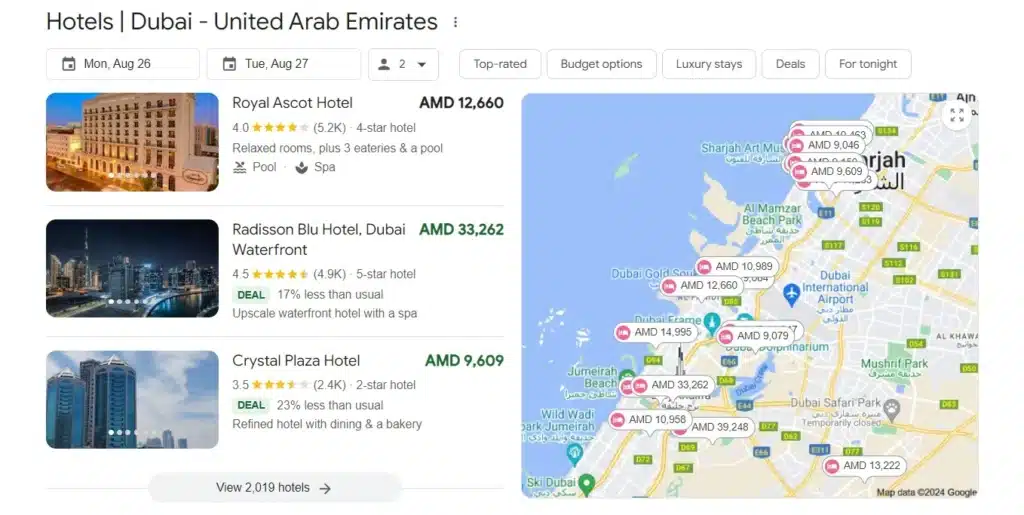
Why Does Schema Markup Matter for a Hotel?
Schema markup, a type of structured data, is essential for hotels because it enhances how search engines interpret and display your website content. Here’s why it matters:
- Improved search visibility: Schema markup helps search engines understand your hotel’s offerings in greater detail. This means your hotel is more likely to appear in relevant searches, making it easier for potential guests to find you.
- Enhanced search listings: With schema markup, your hotel’s search results can include rich snippets. These enriched listings might display room prices, guest ratings, amenities, and booking links directly in the search results. Such detailed and visually appealing information can attract more clicks compared to standard search results.
- Increased Click-Through Rates (CTR): Rich snippets are more engaging and informative, which can lead to higher click-through rates. When potential guests see additional information like star ratings, pricing, and availability right in the search results, they are more likely to click on your listing.
- Accurate information: Schema markup ensures that the information displayed about your hotel is accurate and up-to-date. This reduces the chances of potential guests being misled by outdated or incorrect details.
- Voice search readiness: As voice search becomes more popular, having schema markup can improve your hotel’s chances of being featured in voice search results. Search engines like Google use structured data to provide precise answers to voice queries, making it crucial for staying competitive in the evolving search landscape.
- Competitive advantage: Many hotels have not yet adopted schema markup, giving those who do a significant competitive advantage. By implementing schema markup, you can stand out in search results and attract more bookings than competitors who do not use it.
How to Use Schema to Enhance Your Hotel’s Website?
Implementing schema markup on your hotel’s website can significantly improve its visibility and attractiveness in search engine results. Here’s a step-by-step guide on how to use schema to enhance your hotel’s online presence:
1. Understand the Types of Schema Relevant to Hotels
Start by familiarizing yourself with the types of schema markup that are particularly beneficial for hotels. These include Hotel, HotelRoom, Offer, Review, FAQPage, and LocalBusiness schema. Each of these types helps search engines understand different aspects of your hotel’s offerings.
2. Identify Key Information to Mark Up
Determine the key pieces of information about your hotel that should be marked up. This typically includes:
- Basic hotel details (name, address, contact info)
- Room types and descriptions
- Pricing and special offers
- Guest reviews and ratings
- Frequently asked questions
- Nearby attractions and local business information
3. Use Schema.org to Find the Correct Markup
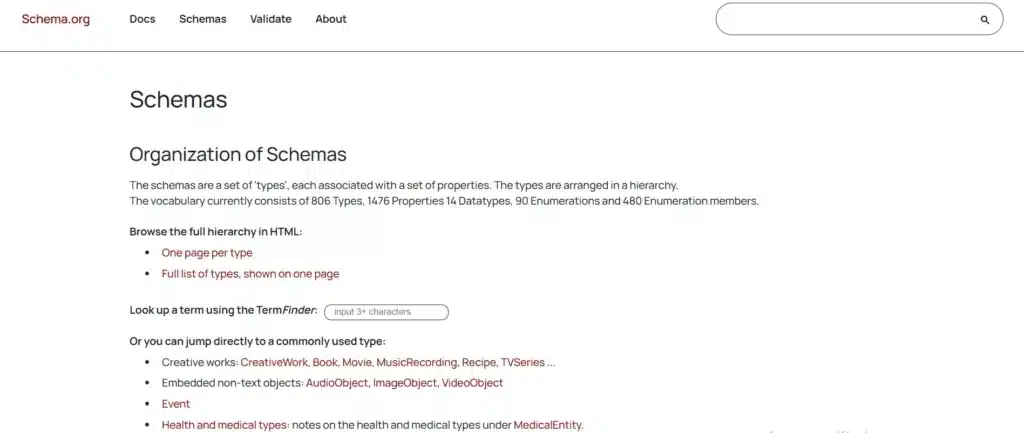
Visit Schema.org to find the appropriate markup for each type of information. Schema.org provides comprehensive documentation and examples to help you implement the correct schema.
4. Add Schema Markup to Your HTML
Integrate the schema markup into your website’s HTML code. This can be done manually or with the help of a developer if you’re not comfortable editing HTML yourself. Ensure that the markup is added to the relevant pages:
- Homepage: For general hotel information and local business details.
- Room pages: For specific room details, pricing, and offers.
- Review pages: For guest reviews and ratings.
- FAQ page: For common questions and answers.
How to Integrate Schema Markup in HTML
Adding schema markup to your website can significantly enhance its visibility and user engagement. Here are three main options to integrate schema markup into your HTML:
1. By Manually Adding the Code on Your Own.
If you are comfortable with HTML and have a basic understanding of JSON-LD or Microdata, you can manually add schema markup to your website.
Steps to Manually Add Schema Markup:
- Identify the Schema Type: Determine which schema types are relevant to your content (e.g., Hotel, HotelRoom, Offer, etc.).
- Generate the Markup: Use Schema.org to create your JSON-LD or Microdata markup.
- Embed the Markup: Insert the JSON-LD script or Microdata tags into the HTML of your web pages.
- Test the Markup: Use Google’s Rich Results Test or Schema Markup Validator to ensure it is correctly implemented.
- Publish the Changes: Once validated, publish the updated HTML to your website.
2. With the Help of a Developer
If you are not familiar with HTML or prefer professional assistance, you can hire a developer to integrate schema markup for you.
Steps to Integrate Schema Markup with a Developer:
- Identify Your Needs: List the types of schema markup you need.
- Find a Developer: Hire a web developer with experience in structured data and SEO.
- Provide Details: Share the necessary details and requirements with the developer.
- Review Implementation: Once the developer has added the markup, review it to ensure accuracy.
- Test and Validate: Use Google’s Rich Results Test to confirm the correct implementation.
- Deploy the Changes: Have the developer publish the updated HTML to your website.
3. By Automating the Process with a Tool
Several tools can automate the process of adding schema markup to your website, making it easier for those who may not have technical expertise.
Steps to Automate Schema Markup Integration:
- Choose a Tool: Select a schema markup tool or plugin (e.g., Google Tag Manager, Schema App, or a WordPress plugin like Yoast SEO).
- Set Up the Tool: Install and configure the tool according to your website’s platform.
- Generate Markup: Use the tool’s interface to generate the necessary schema markup.
- Embed the Markup: The tool will typically provide instructions or automatically insert the markup into your HTML.
- Test the Markup: Use Google’s Rich Results Test to ensure the markup is correctly implemented.
Example Using a WordPress Plugin (Yoast SEO):
- Install Yoast SEO: Go to the WordPress admin panel, search for the Yoast SEO plugin, and install it.
- Configure Yoast SEO: Follow the setup wizard to configure the plugin for your site.
- Add Schema Data: Navigate to the Yoast SEO settings and enter your organization’s information under the “Search Appearance” tab.
- Review and Publish: The plugin will automatically add the appropriate schema markup to your site’s HTML.
5. Test Your Markup
Use Google’s Rich Results Test or the Schema Markup Validator to test your markup. These tools will help you verify that the structured data is correctly implemented and can be read by search engines.
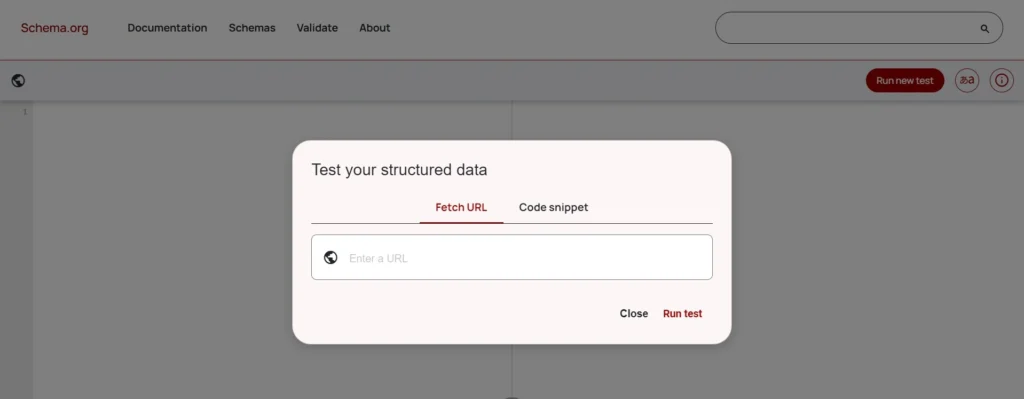
6. Monitor and Update Your Markup
Regularly monitor your schema markup to ensure it remains accurate and up-to-date. As your hotel’s offerings change, such as new room types or updated pricing, make sure to update the markup accordingly.
7. Use Structured Data for Rich Results
Once your schema markup is implemented and verified, it can lead to rich results in search engine listings. This can include features like rich snippets, knowledge panels, and enhanced local search results, all of which make your hotel more appealing to potential guests.
Types of Schema Hotels Should Consider
Implementing structured data effectively requires knowing the different types of schema that can enhance your hotel’s online presence. Here are some essential types of schema you should consider:
Hotel Reviews
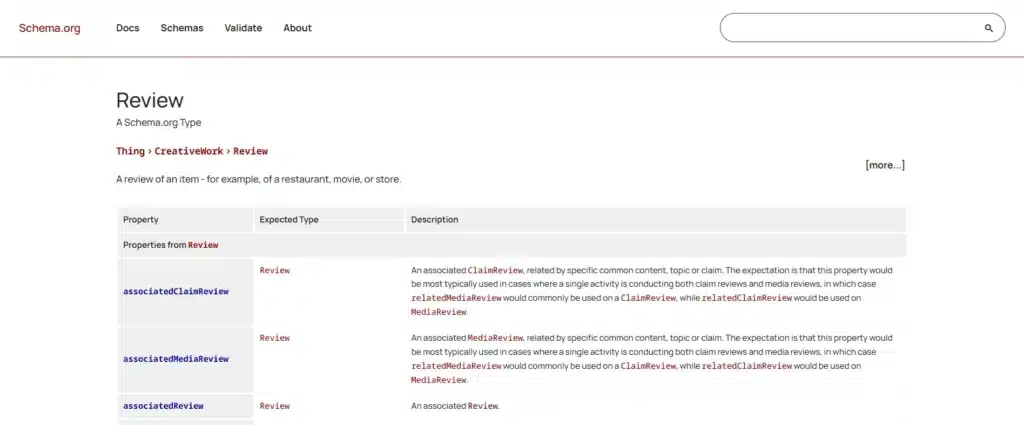
Hotel reviews are one of the most influential factors for potential guests when choosing where to stay. Positive reviews can significantly boost a hotel’s reputation and attract more bookings. Implementing structured data for reviews ensures that search engines can better understand and display these reviews, making them more visible and appealing in search results.
Link to Review schema- Hotel Reviews Schema
Local Business Information
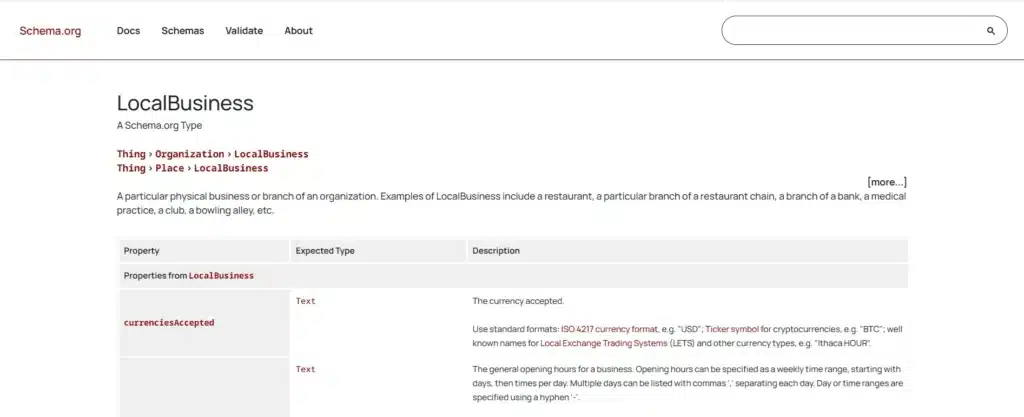
This schema type includes general business information like name, address, and phone number (NAP details), as well as industry-specific details such as the number of rooms, room rates, check-in/check-out times, pet policy, and more.
Link to Local Business Information schema- Local Business Information
Hotel Information
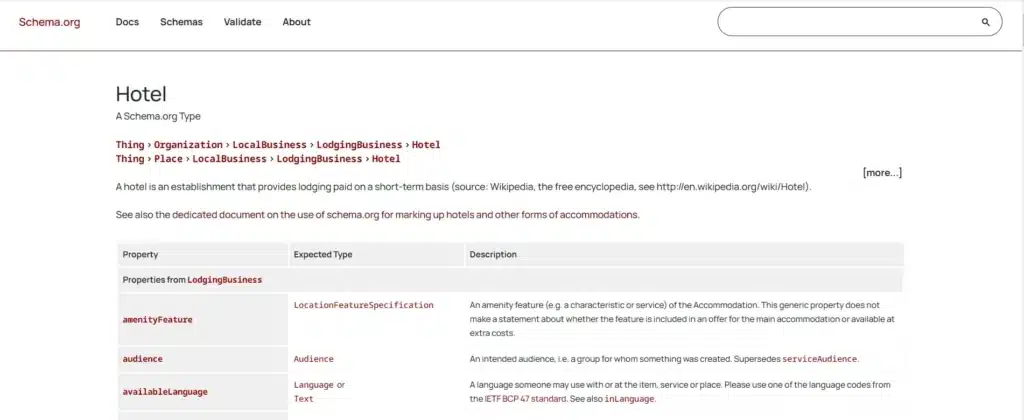
Using schema to provide general information about your hotel is a great starting point, but hospitality marketers can take it much further. By utilizing specific, advanced types of schema markup, hotels can significantly enhance their search engine visibility and user experience.
By combining these schema types, you can provide a rich, detailed description of your hotel, its accommodations, and the offers available. This comprehensive approach helps search engines understand the full scope of your hotel’s offerings, leading to better visibility and more attractive search results.
Here’s a breakdown of the next-level schema types for hotels:
Lodging Business: The Lodging Business schema is used to describe the hotel or other accommodation business itself. This includes the overall establishment, which may consist of multiple buildings or locations.
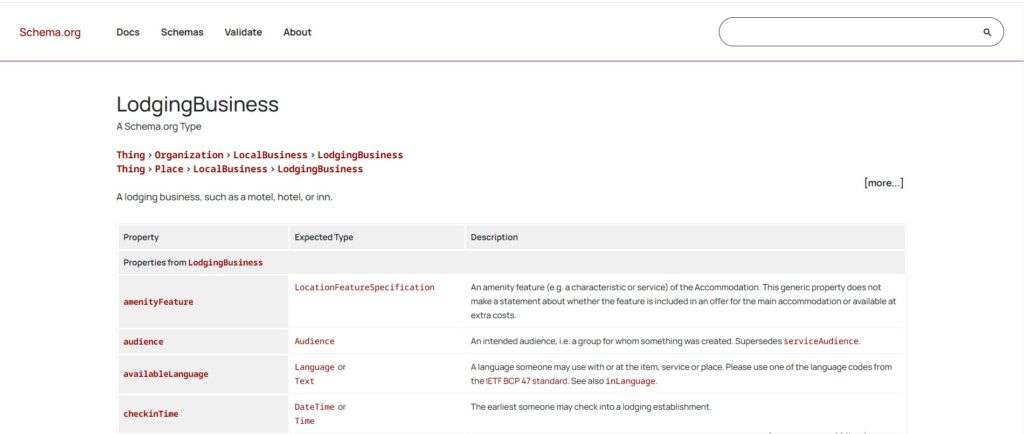
Accommodation: The Accommodation schema is used to describe the specific units within the lodging business that are available for rent. This can include hotel rooms, suites, apartments, meeting rooms, and more.
The Accommodation schema is a broader category that encompasses various types of lodging facilities, not limited to hotel rooms. It can describe a wide range of places where people can stay, including hotels, hostels, resorts, motels, campsites, apartments, and vacation rentals.
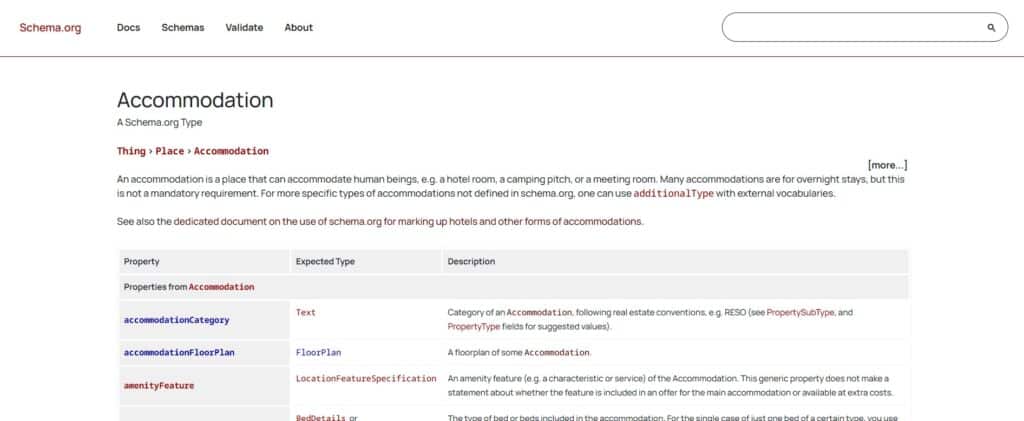
HotelRoom: The “HotelRoom” schema is a more specific type of schema within the broader “Accommodation” category. It is used to describe individual rooms or suites within a hotel or similar lodging facility.
Offer: The Offer schema is used to describe the specific terms of renting an accommodation unit, including pricing, availability, and any conditions or restrictions.
Frequently Asked Questions
Websites across many industries use FAQ schema to answer common questions from travelers. This can be especially useful because, when Google chooses to use it as a rich snippet, a search user can have an answer before they even click through to your website.
FAQ snippets also take up more space on the SERP and, since nearly half of search users don’t ever click any result, it’s a good way to provide more information directly.
How to Implement FAQ Schema for Your Hotel
Adding FAQ schema to your website involves identifying common questions and answers, then marking them up with the appropriate schema:
- Identify common questions: Compile a list of frequently asked questions from your guests. This can include inquiries about booking policies, amenities, check-in/check-out times, and more.
- Create comprehensive answers: Provide clear and concise answers to each question. Ensure that the information is accurate and up-to-date.
- Use the FAQ schema markup: Implement the schema markup on your website to structure the questions and answers.
Link to FAQ markup- Question schema
More examples of Hotel Schema Markup Implementation
1. Luggage
Although there isn’t a specific “Luggage” schema, you can include luggage-related services as part of the “AmenityFeature” property within the “Hotel” schema. This helps highlight important services like luggage storage or handling.
2. Group Holidays
To describe group holiday packages, use a combination of “TouristTrip” and “Offer” schema types to detail the package and its terms. This schema helps hotels highlight special group travel packages, providing detailed information about the itinerary, pricing, and terms.
By implementing this schema, hotels can attract larger groups, such as corporate teams, family reunions, or travel clubs, showcasing tailored packages that meet their specific needs. This can significantly enhance search visibility for group travel-related queries and drive more targeted traffic to the hotel’s booking pages.
3. Tour Operator
The “Tour Operator” schema is used to provide detailed information about a company that arranges and sells tours and travel packages. This can include information about the tours they offer, contact details, and other relevant business information.
For hotels that offer in-house tour services or partner with local tour operators, using this schema helps search engines understand and display these offerings prominently. This can attract tourists looking for comprehensive travel experiences that include accommodation, tours, and activities, thereby increasing bookings and customer satisfaction.
4. Event
The “Event” schema is used to describe events hosted by the hotel, such as conferences, weddings, or special occasions. By implementing this schema, hotels can effectively promote their event-hosting capabilities, attracting planners and attendees.
Events are a significant revenue stream for many hotels, and having detailed event information readily available in search results can lead to increased inquiries and bookings. It helps search engines present key details like event dates, locations, and ticket prices directly in search results, making it easier for potential attendees to find and act on this information.
5. Restaurant
The “Restaurant” schema is used to describe the hotel’s dining options, including cuisine, opening hours, and menu. For hotels with on-site restaurants, using this schema can enhance the visibility of their dining services in search results. It allows potential guests and local diners to find relevant information about the restaurant’s offerings quickly. Highlighting specific details such as types of cuisine, hours of operation, and menu items can attract more diners, improve the guest experience, and increase overall revenue from food and beverage services.
6. Article schema
The “Article” schema is used to mark up blog posts, news articles, or other written content on your website. Hotels often use blogs and articles to share travel tips, local attractions, hotel updates, and other valuable information. Implementing the “Article” schema helps ensure that this content is correctly indexed by search engines, potentially leading to higher rankings in search results.
Well-structured articles can drive organic traffic to the hotel’s website, establish the hotel as an authority in the travel industry, and engage visitors with useful and interesting content. This can ultimately lead to increased brand awareness and more direct bookings.
Wrapping It Up
By using these different types of schema, hotels can provide a comprehensive and detailed view of their offerings to search engines. This not only enhances the visibility of the hotel in search results but also improves the user experience by making relevant information readily accessible. Implementing a variety of schema types is a powerful strategy for hospitality marketers looking to attract more guests and improve their online presence.

